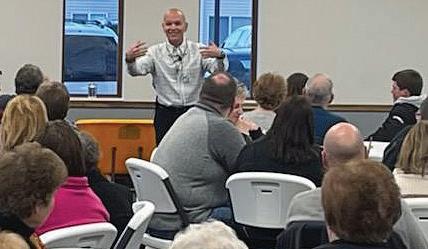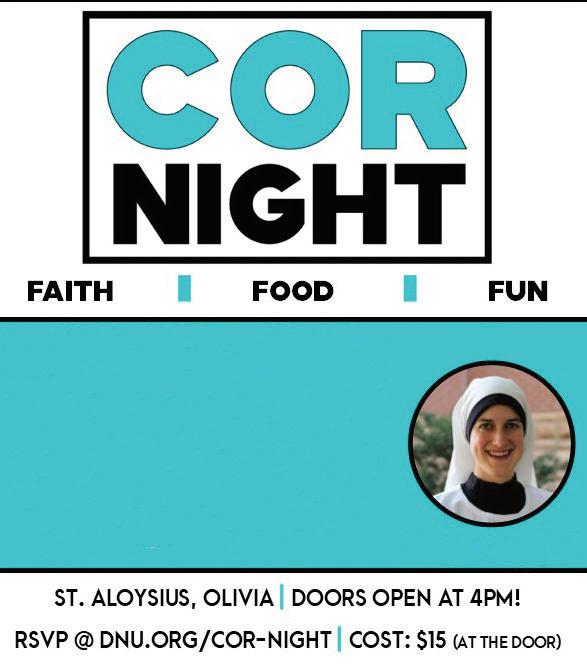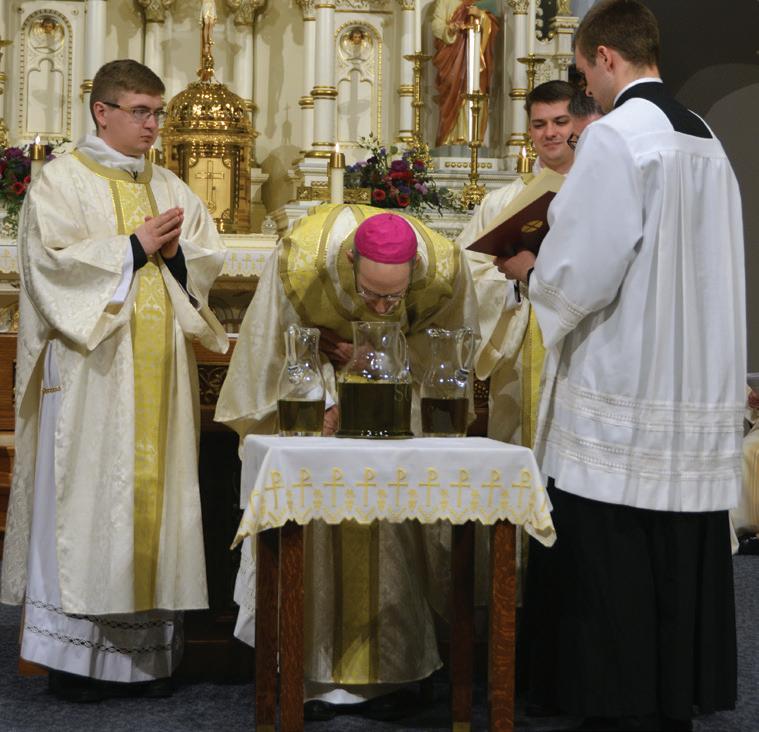
16 minute read
Continued on

by Fr. Mark Steffl, STL, JCL
Advertisement
There is a significant portion of the Code of Canon Law that deals with things relating to the lives of priests, as well as specific duties and obligations relating to different assignments priests may receive (such as to serve in a particular parish or as a chaplain to some specific group) or offices that they may hold (such as vicar general or judicial vicar for a diocese).
In addition to what is in the Code of Canon Law, the Holy See has issued a “Directory for the Ministry and Lives of Priests.” National conferences of Catholic bishops can regulate specifics of priests in a certain country and each diocese can (and usually does) have its own policies
education Ask a Canon Lawyer
This month’s question:
governing what is expected of and provided for priests. (One can imagine, for example, that a priest in a missionary area of the world might require very different remuneration for basic personal expenses than someone in an urban area of a developed nation.)
Relating to the specific area of the question, we can find much of our answer in canon 282 of the Code of Canon Law, in a chapter titled “The Obligations and Rights of Clerics” (see inset box).
It is important to start with the misconception that all priests make vows of poverty. There are certain religious congregations wherein members make a vow of poverty, meaning that they have nothing that they themselves can own.
But diocesan priests that make up the great majority of the priests that are serving in parishes in the Diocese of New Ulm do not make such a “vow of poverty” but instead are bound to live a “simple way of life and to avoid anything that has a semblance of vanity or worldliness” as the first section of canon 282 prescribes. (Diocesan priests are specifically referred to in the Code as “secular priests” to differentiate from “religious priests” who belong to a religious institute such as the Benedictines or Jesuits.)
Diocesan priests receive a small salary which is intended to cover the expenses that they have in their personal upkeep and to provide for their personal and pastoral needs, such as to have a car, clothes and other necessities. Housing is provided for a priest who is assigned to work in a parish, usually in the form of a rectory or other accommodations which the parish provides, including furniture. Health insurance and a stipend for food and groceries are other examples of things that are also supplied to priests who are assigned to a parish.
The “simplicity of life” that is expected of a priest means that he does not get weighed down with the things of the world that would be a distraction either for him or the Christian faithful that he serves. For example, a priest needs a car and clothing, but there is a difference between different models and brands of cars that might be seen as a luxury rather than a basic need. It is easily seen that the Lord has this expectation of his apostles when he sends them out with very specific instructions as to what they are to take and not take along in their mission, such as in Luke 9:2 when the Lord says, “Take nothing for your journey, neither a staff, nor a bag, nor bread, nor money; and do not even have two tunics.”
In section 2 of canon 282, the Church directs that anything above the needs of a priest should be used “for the good of the Church and for charitable works.” These are some challenging words to the priest so that he will learn to trust in the Lord and better live a life of service to the Christian faithful.
Can. 282 §1. Clerics are to follow a simple way of life and avoid anything that has a semblance of vanity or worldliness. §2. Goods which they receive on the occasion of the exercise of an ecclesiastical office, and which are over and above what is necessary for their worthy upkeep and the fulfillment of all the duties of their state, they ought to use for the good of the Church and for charitable works.
Editor’s note: Fr. Mark Steffl is a canon lawyer and serves as judicial vicar of the diocesan Office of the Tribunal. If you have a question regarding Canon Law for Fr. Steffl, email The Prairie Catholic, cclancy@dnu.org.
NEXT ISSUE: What is the relationship and difference between an archbishop and a bishop?
Bishops advocate for families
(Continued from page 1.)
view the Church as a home for people to know, love, and serve the Lord.
Opposition to sports gambling platforms
Minnesota’s Catholic bishops joined a coalition of faith leaders from Minnesota’s Jewish, Muslim, and Protestant communities to express their opposition to the legalization of commercial sports gambling via a letter delivered to the governor and every member of the Minnesota House and Senate.
The letter – which was spearheaded by MCC’s partner organization, the Joint Religious Legislative Coalition (JRLC) –lays out concerns not only from a moral perspective, but also addressing the very real costs of gambling and the damage that would be created by normalizing mobile gambling. dozen faith leaders ranging from rabbis in Duluth, to rural area Protestant leaders, to Muslim imams in the Twin Cities, highlights the underreported reality that the push by sports gambling companies to enter Minnesota is not as widely embraced as lawmakers may have been led to believe.
The full letter can be read at www.mncatholic.org/gambling.
Action Alert!
Lawmakers are attempting to make Minnesota the land of anytime, anywhere gambling by allowing sports betting through mobile apps. A new source of addition and depravation must not be unleased just so a privileged few can have a bit more fun watching a ballgame. Please visit MCC’s Action Center to find ways to get engaged on this important issue, at www. mncatholic.org/actioncenter.
The fact that the letter was signed by a diverse array of nearly two
U.S. Bishops’ Migration Chairman addresses termination of Title 42
WASHINGTON – On April 1, the Centers for Disease Control and Prevention (CDC) issued an order terminating the use of Title 42 of the U.S. Code to prohibit certain noncitizens from entering the United States, effective May 23, 2022. Originally begun in a purported effort to reduce COVID-19 transmission, this policy has led to the expulsion of more than one million migrants by the U.S. Department of Homeland Security (DHS) since 2020, including many asylumseeking children and families. In implementing this policy, DHS has overridden normal immigration proceedings and skirted due process protections, forcibly returning vulnerable individuals to places where their lives are in danger. Bishop Mario E. Dorsonville, auxiliary bishop of Washington and chairman of the U.S. Conference of Catholic Bishops’ Committee on Migration, issued the following statement: “We welcome the end of this harmful policy. In its place, my brother bishops from along the U.S.-Mexico border and I have long urged policies that are supported by sound scientific rationales, respect migrants’ intrinsic dignity, preserve human life, and provide for safe, orderly, and humane immigration, all while acknowledging the right of nations to maintain their borders.
“Let us be clear: any perceived or actual increase in vulnerable migrants seeking refuge at our border in the coming months will not be a direct result of this change. Many are already at our door, having been forced to languish in Mexico for an indefinite period of time, unable to avail themselves of the opportunity to seek protection in accordance with U.S. and international law. Persecution, violence, natural disasters, and other root causes of migration will continue to force people to seek protection until more robust efforts are undertaken to address them.
“We urge the Biden Administration to implement a comprehensive plan for the border that ensures the humane treatment of all persons and respects their God-given dignity, while safeguarding due process. This can only be achieved successfully through government-led preparations made in close coordination with border communities and civil society across the country, especially organizations providing humanitarian support. “In less than two weeks, we will celebrate the Solemnity of Easter. In preparing our hearts to encounter Christ’s ultimate sacrifice, let us ponder his unwavering love for us and allow it to move us toward that same outpouring of charity when faced with the challenges of our time.”
around the diocese Lenten parish mission challenges faithful to live an authentic Christian life
by Madison Field Prairie Catholic correspondent
WATKINS – In March, St. Anthony’s Catholic Community in Watkins, located in the far northeast corner of the Diocese of New Ulm, along with the Area Catholic Communities of Eden Valley and Paynesville, both located in the Diocese of St. Cloud, joined for a Lenten parish mission titled “Into the Deep,” led by Deacon Ralph Poyo, founder of New Evangelization Ministries (NEM).
Prior to the mission which ran from March 27-30, 2022, Deacon Poyo preached at all of the weekend Masses to encourage mission attendance. The congregation interacted with responses and laughter as he shared his experiences and related Bible passages to today’s modern experiences.
Deacon Poyo admitted that we often go through the motions or do what we think ‘good Catholics’ should do but do not deeply know God or our faith. “If you don’t want to spend time with God now, what makes you think you will want to spend the rest of eternity with Him in Heaven?” he asked. Deacon Poyo promised to show what God intends for the lives of his people during the four-day Lenten mission.
An hour of adoration preceded each evening’s mission talk on God’s saving plan, spiritual warfare, living in the Holy Spirit, and discipleship. Each presentation brought attention to ways we tend to leave God out of our lives and how we can put Him back into our lives with great love and authenticity.
Small group leader session
The Saturday morning before the mission, about a dozen parishioners attended a training session hosted by Deacon Poyo on how to be a small group leader. The session began with sharing experiences and a time for discussion, helping Deacon Poyo to get to know the parish staff, pastor, and parishioners.
Deacon Poyo also shared some common problems he has seen as he travels around the country. For example, for decades, small groups and Catholic education programs have been content-driven, when 85 percent of evangelization should be relationship-building and purposedriven. “Content is a vehicle” that “challenges you to go deeper than the script,” the deacon explained.
“As we work to be purposedriven, we should be creating a desire for the depths of God in those we meet,” he said.
Relationships and trust are key.
Deacon Poyo believes two things are necessary for effective small Deacon Ralph Poyo speaks to those attending “Into the Deep,” a four-day Lenten mission in the Catholic Community of Watkins in the Diocese of New Ulm and Eden Valley and Paynesville in the Diocese of St. Cloud. (Photo by Madison Field)

groups and evangelization – genuine relationships and trust, allowing love to flow. He said that authentic Catholicism requires us to take off our “mask” of being a “perfect Catholic” and begin sharing the things that are hard to talk about, the things we are struggling with and would bring to the sacrament of confession. “When we talk about it, it creates a longing for healing. This is the power of small groups!” he exclaimed.
Deacon Poyo said relationships and trust are where we desperately need each other and the Lord. “Satan has trained everyone to reject Jesus every day,” he warned, later explaining that what we hide from God and others hinders our ability to love and experience true freedom. On the contrary, “Your vulnerability opens it up for others, casting light for the Holy Spirit to work,” and then “people become lights for others.”
“If it is authentic, there is value. That’s the thing we aren’t providing. Value is what people really want and need,” Deacon Poyo said.
Deacon Poyo said that parish leaders are called to model these values and enforce expectations of confidentiality as their members are asked to keep going deeper.
“I really liked his [Deacon Poyo] approach to challenging people to live an authentic Christian life,” said Fr. Aaron Nett, pastor of St. Anthony and Assumption parishes. “It is our foundational base. We must live it, and then we can proclaim it by our personal witness.”
“Catholics have the duty of making disciples and bringing Christ into our daily life, relationships, and every place we go,” said Fr. Nett. “People want to. You can hear it when they talk about wanting their children to come back [to the Church].”
During Saturday’s session, Deacon Poyo encouraged time to “debrief,” which he said is done by cultivating our language and ability to speak about the ways God is working in our lives, a point he also stressed throughout the four-day mission. Processing how we have encountered God and giving words to our experience is something he sees Catholics not always good at doing. As people encounter God, it is helpful to ask: “What just happened to you?” or make the statement: “that ‘something’ you are feeling is called the Holy Spirit!”
According to Deacon Poyo, “Authentic conversion is always from the inside out. Let him [the Holy Spirit] have that freedom and watch what happens!”
Sunday, May 15 “Love Ya Mom: Getting to Know Mary”

Hail Mary, full of grace. . . You have said the prayer a thousand times, but have you ever stopped to consider what it means? Sr. Cecilia will tell us more about Mary and why we need her.
Sr. Cecilia, ACJ
Faithful gather for annual Chrism Mass
by Christine Clancy The Prairie Catholic
NEW ULM – Bishop Emeritus John M. LeVoir returned to the Cathedral of the Holy Trinity in New Ulm on April 7, 2022, to bless the oil of the Sick and the oil of the Catechumens, and consencrate the Sacred Chrism during the annual Chrism Mass – the first such celebration in two years due to the coronavirus pandemic. The oils will be used in parishes throughout the year.
Bishop LeVoir’s homily reflected on being more “internal,” which is something he said Pope Francis has been asking all of us to do. The bishop said that we need to “really concentrate on asking Christ to come and dwell within us and let all of our actions be manifested from that presence of Christ in our souls and our hearts. That is a big challenge!” he said. The bishop continued, “Things are very busy in this world, busy for all of us. We get so immersed in the material, the details that we do, the obligations that we have, responsibilities that we have to fulfill that sometimes that gets neglected - and really it shouldn’t,” he said. The bishop emphasized that the most important aspect of our lives is our union with Jesus Christ. “If that is not there, there is not much good that is going to happen,” he said. “I think that is why Pope Francis is asking us to think about our interior spiritual life and invite Christ every day into the inner core of our being.” Bishop LeVoir breathes over the vessel containing the Chrism oil during the Chrism Mass. The gesture symbolizes the Holy Spirit coming down to consecrate the Chrism. (Photo by Christine Clancy)
A recording of the Chrism Mass and photo highlights are available at www.dnu.org/2022chrismmass


MANKATO, Minn. – The School Sisters of Notre Dame (SSND) Central Pacific Province
announced March 14, 2022, the next steps for sisters living at Our Lady of Good Counsel in Mankato, Minn., and their property there. The sisters currently living there will move to Benedictine Living Community in Shakopee, Minn. In addition, the religious order is in negotiations with a developer for the purchase of the property at Our Lady of Good Counsel.
Since 2014, the SSNDs have been working on a visioning process based on continuing their mission in light of current realities. “Of utmost importance is the sustainability of our mission guided by dialogue, collaboration, community life, service, prayer and communal discernment, ecological sensitivity, and openness to change,” said Sister Debra Sciano, Provincial Leader.
“The initial goal of the SSND Good Counsel Work Group was to find quality healthcare, ideally in the Mankato area, in a facility that kept the sisters together and was financially feasible,” said Sister Mary Kay Gosch, Campus Administrator. However, she said “It became evident that the hope of living in one facility, at Our Lady of Good Counsel or elsewhere in Mankato, was not possible.”
On April 14, 2022, Florida Gov. Ron DeSantis signed into law a bill protecting the unborn
from abortion after 15-weeks gestation. The state’s Catholic bishops praised DeSantis for his “commitment to defend unborn children and their mothers” and for his leadership in encouraging the Legislature to take up the bill and pass it and for his own support of the measure.

About a week earlier, the bishops welcomed a judge’s ruling upholding a 2015 state law that gives women 24-hours to reflect on information provided by physicians before proceeding with abortions.
Regarding the 15-week abortion ban, the “historic law,” as the bishops termed it, takes effect July 1 and includes provisions to improve infant health and to analyze and reduce fetal and infant mortality. It replaces a previous law that allowed abortions until 24 weeks of pregnancy.
During the governer’s remarks, he referred to the aborted babies recently found in Washington, D.C. “What we’re doing today is saying that we will not let that happen in the state of Florida,” the Republican politician said. Anti-abortion activists Lauren Handy and Terrisa Bukovinac of Progressive Anti-Abortion Uprising (PAAU) first told reporters on April 5 that they obtained 115 aborted babies from a driver for a medical waste company outside a D.C. abortion clinic, Washington Surgi-Clinic, with the intention of giving the unborn children a dignified funeral and burial.
Five of the babies, who appear to be of late-term gestation, were located by the Metropolitan Police Department on March 30. PAAU says it arranged for the D.C. police to collect and examine the babies, fearing that the babies’ injuries could be evidence of illegal abortions.
Since then, lawmakers have sent multiple letters calling for a full investigation and autopsies of the babies’ bodies. D.C. Mayor Muriel Bowser has given no indication that the city intends to autopsy the remains.
DeSantis addressed what he called a “terrible scandal” “They found all these remains of babies, and they found five who were basically infants, premature. . . they would have been able to survive outside the womb,” he said. “Yet Washington, D.C. is treating that just like we would treat the trash from our lunch or something like that.”
“It’s really horrifying to see that that could go on in our country, but particularly in our nation’s capital,” he concluded.
Video Easter Reflections by Msgr. Douglas Grams - www.dnu.org




